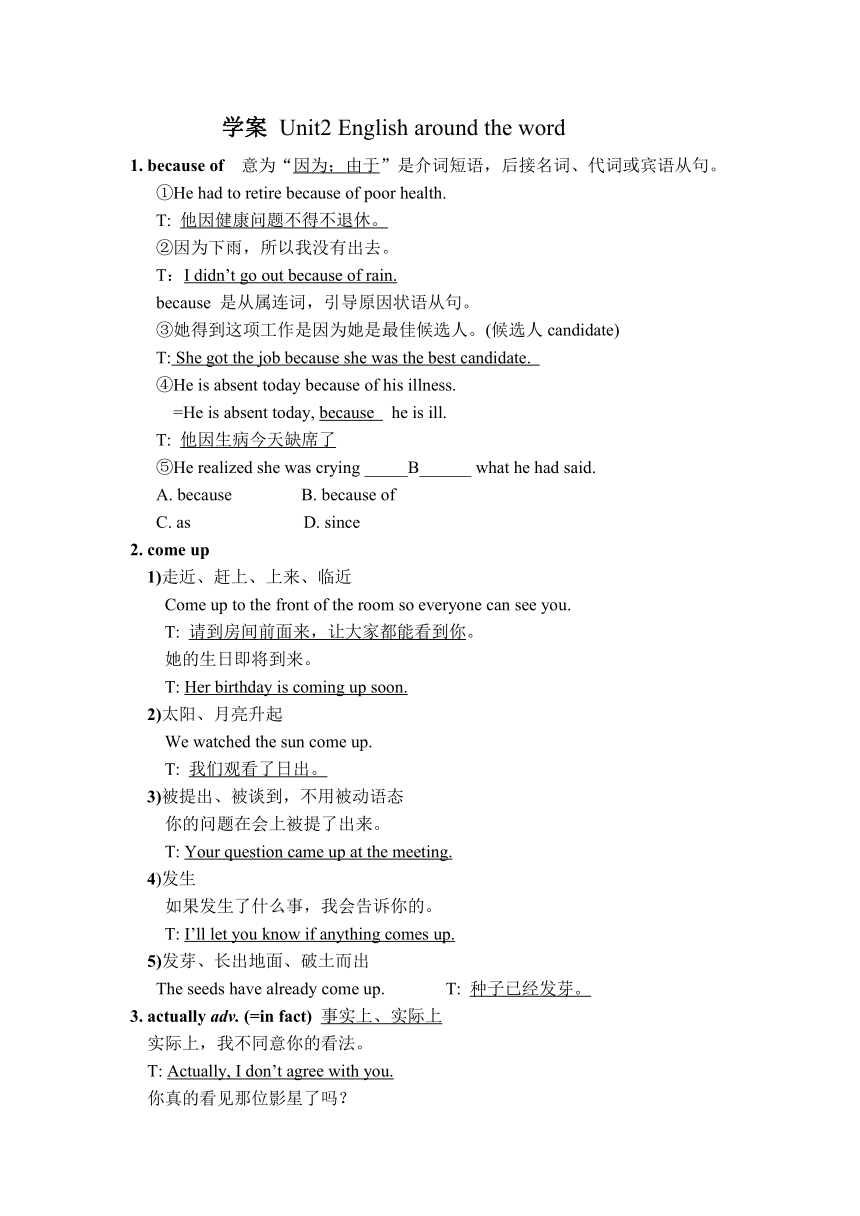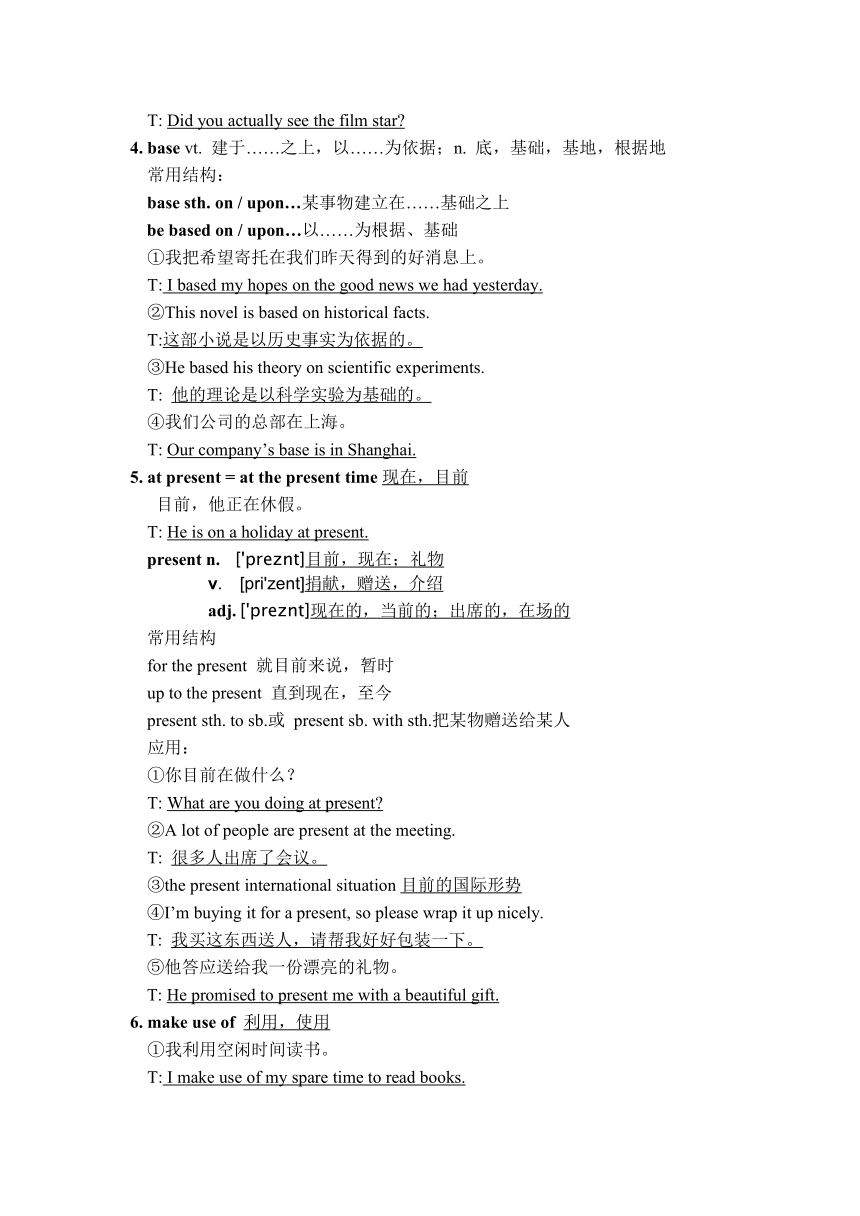Unit 2 English around the world重点单词讲解
文档属性
| 名称 | Unit 2 English around the world重点单词讲解 |

|
|
| 格式 | zip | ||
| 文件大小 | 18.2KB | ||
| 资源类型 | 教案 | ||
| 版本资源 | 人教版(新课程标准) | ||
| 科目 | 英语 | ||
| 更新时间 | 2011-09-26 00:00:00 | ||
图片预览


文档简介
学案 Unit2 English around the word
1. because of 意为“因为;由于”是介词短语,后接名词、代词或宾语从句。
①He had to retire because of poor health.
T: 他因健康问题不得不退休。
②因为下雨,所以我没有出去。
T:I didn’t go out because of rain.
because 是从属连词,引导原因状语从句。
③她得到这项工作是因为她是最佳候选人。(候选人candidate)
T: She got the job because she was the best candidate.
④He is absent today because of his illness.
=He is absent today, because he is ill.
T: 他因生病今天缺席了
⑤He realized she was crying _____B______ what he had said.
A. because B. because of
C. as D. since
2. come up
1)走近、赶上、上来、临近
Come up to the front of the room so everyone can see you.
T: 请到房间前面来,让大家都能看到你。
她的生日即将到来。
T: Her birthday is coming up soon.
2)太阳、月亮升起
We watched the sun come up.
T: 我们观看了日出。
3)被提出、被谈到,不用被动语态
你的问题在会上被提了出来。
T: Your question came up at the meeting.
4)发生
如果发生了什么事,我会告诉你的。
T: I’ll let you know if anything comes up.
5)发芽、长出地面、破土而出
The seeds have already come up. T: 种子已经发芽。
3. actually adv. (=in fact) 事实上、实际上
实际上,我不同意你的看法。
T: Actually, I don’t agree with you.
你真的看见那位影星了吗?
T: Did you actually see the film star
4. base vt. 建于……之上,以……为依据;n. 底,基础,基地,根据地
常用结构:
base sth. on / upon…某事物建立在……基础之上
be based on / upon…以……为根据、基础
①我把希望寄托在我们昨天得到的好消息上。
T: I based my hopes on the good news we had yesterday.
②This novel is based on historical facts.
T:这部小说是以历史事实为依据的。
③He based his theory on scientific experiments.
T: 他的理论是以科学实验为基础的。
④我们公司的总部在上海。
T: Our company’s base is in Shanghai.
5. at present = at the present time现在,目前
目前,他正在休假。
T: He is on a holiday at present.
present n. ['preznt]目前,现在;礼物
v. [pri'zent]捐献,赠送,介绍
adj. ['preznt]现在的,当前的;出席的,在场的
常用结构
for the present 就目前来说,暂时
up to the present 直到现在,至今
present sth. to sb.或 present sb. with sth.把某物赠送给某人
应用:
①你目前在做什么?
T: What are you doing at present
②A lot of people are present at the meeting.
T: 很多人出席了会议。
③the present international situation目前的国际形势
④I’m buying it for a present, so please wrap it up nicely.
T: 我买这东西送人,请帮我好好包装一下。
⑤他答应送给我一份漂亮的礼物。
T: He promised to present me with a beautiful gift.
6. make use of 利用,使用
①我利用空闲时间读书。
T: I make use of my spare time to read books.
make good/ full/ little use of 好好/充分/不充分利用
make the best of/ make the most of 充分利用
②Make the best of every chance you have to speak English.
T: 要充分利用一切机会说英语。
③You should be outside making the most of the sunshine.
T: 你应该到户外尽量多晒晒太阳。
7.such as 例如……(举多个例子)用来列举同类人或事物中的几个,放在被列举的人或事物之前,such as之后不用逗号。它后面列举的事物的数量不能等于它前面所提到的总和,一旦相等就要用that is或namely。
True or False
①( F ) I have three friends, such as John, Jack, and Tom.
②( T ) I have three friends, that is, John, Jack, and Tom.
for example(一个例子)作为插入语可以放在句首,句中或句末。
③I visited many cities, such as Shanghai, Paris, and London.
④Only two person can do the job, namely you and I.
⑤Noise, for example, is a kind of pollution.
⑥He can speak five languages, such as German and French.
8. command (v.) 命令,指令,掌握,赢得 (n.)命令,指令,掌握
+ 名词
V. sb. to do sth.
That +S+(should) +do +…
①Dr. Yang commands a great deal of respect as a surgeon.
T: 作为外科医生,杨博士博得了(社会的)敬仰。
②军官命令手下开枪。
The officer commanded_____ his men _to_____ ___fire___.
③Our teacher commanded all of us ___A____ to the classroom earlier.
A. come B. came
C. had come D. would come
注意:command用作名词时,其后的表语从句或同位语从句要用should+动词原形,或省略should。
④You must obey the captain’s commands.
T: 你必须服从船长的命令。
⑤The army received a command that they ___C____ to the front immediately.
A. would march B. must march
C. should march D. were marching
⑥We should have/ get a good command of English.
T:我们应该精通英语。
9. request n. /v.请求,要求,恳求,邀请
名词/ 代词
V. + sb. to do sth.
sth. from/ of sb.
That +S+(should) +do +…
The workers requested a rise in the salary.
T: 工人们要求提高工资。
②Visitors are requested not to walk on the grass.
T: 游客们不允许踩草坪。
我要求他给我那本字典。
T: I requested the dictionary from him.
④我们要求下次会议在周五举行。
T: We requested that the next meeting (should) be held on a Friday.
注意:request用作名词时,其后的表语从句或同位语从句要用should+动词原形,或省略should。
⑤We should make a request for help.
T: 我们应该请求援助。
⑥我的请求是你应该帮助我
T: My request is that you (should) help me.
10. play a part /role in扮演一个角色;参与;在……中起作用
①He played the role of the old king in our school play.
T:在我们学校的戏剧中他扮演老国王的角色。
②他在他办公室中起重要作用。
T: He played an important role in his office.
11. recognize vt. 辨认出;承认;公认
①I recognized her in the crowds at the first sight.
T: 我在人群中一眼就认出了她。
常用短语:
recognize sb. as/ to be…把某人看作是
②他们认为他是伟大的领导者。
T: They recognized him to be a great leader.
③He recognized that he had made a mistake.
T: 他承认犯了错误。
recognize /realize /know 的辨析
recognize 指辨认出原来很熟悉,经过一段时间的间隔或别的原因后又重新认出来,是终止性动词。
④I didn’t recognize his voice.
T: 我没有听出他的声音。
realize 意识到强调在经过一个过程后的完全了解、认识到。
⑤At last, we realized that we had to overcome many difficulties.
T: 最后,我们意识到我们还要克服许多困难。
know 认识,熟悉是延续性动词,指相互间十分熟悉、十分了解。
⑥We have known each other for ten years.
T: 我们已经认识十年了。
练习:
⑦I have known him for seven years. But I didn’t recognize him just now because he has changed so much.
⑧--- Oh, it’s you! I ___A___ you.
--- I’ve just had my hair cut, and I’m wearing new glasses.
A. didn’t recognize B. hadn’t recognized
C. haven’t recognized D. don’t recognize
⑨Tom is recognized ___B___ the best student.
A. to B. as C. with D. for
12. straight adj.直的;笔直的;正直的
adv.直接;挺直
a straight line直线 a straight road笔直的公路
sit up straight坐直 go straight 直走
①沿着这条路一直走,然后左转。
T: Go straight down the road and then turn left.
②His friend is a tall, slim girl with a straight nose.
T: 他的朋友是位鼻子挺直,身材高而苗条的姑娘。
Postscript:__________________________________________________________________________________________________________________________________________________________________________________________________________________________________________________________________________
1. because of 意为“因为;由于”是介词短语,后接名词、代词或宾语从句。
①He had to retire because of poor health.
T: 他因健康问题不得不退休。
②因为下雨,所以我没有出去。
T:I didn’t go out because of rain.
because 是从属连词,引导原因状语从句。
③她得到这项工作是因为她是最佳候选人。(候选人candidate)
T: She got the job because she was the best candidate.
④He is absent today because of his illness.
=He is absent today, because he is ill.
T: 他因生病今天缺席了
⑤He realized she was crying _____B______ what he had said.
A. because B. because of
C. as D. since
2. come up
1)走近、赶上、上来、临近
Come up to the front of the room so everyone can see you.
T: 请到房间前面来,让大家都能看到你。
她的生日即将到来。
T: Her birthday is coming up soon.
2)太阳、月亮升起
We watched the sun come up.
T: 我们观看了日出。
3)被提出、被谈到,不用被动语态
你的问题在会上被提了出来。
T: Your question came up at the meeting.
4)发生
如果发生了什么事,我会告诉你的。
T: I’ll let you know if anything comes up.
5)发芽、长出地面、破土而出
The seeds have already come up. T: 种子已经发芽。
3. actually adv. (=in fact) 事实上、实际上
实际上,我不同意你的看法。
T: Actually, I don’t agree with you.
你真的看见那位影星了吗?
T: Did you actually see the film star
4. base vt. 建于……之上,以……为依据;n. 底,基础,基地,根据地
常用结构:
base sth. on / upon…某事物建立在……基础之上
be based on / upon…以……为根据、基础
①我把希望寄托在我们昨天得到的好消息上。
T: I based my hopes on the good news we had yesterday.
②This novel is based on historical facts.
T:这部小说是以历史事实为依据的。
③He based his theory on scientific experiments.
T: 他的理论是以科学实验为基础的。
④我们公司的总部在上海。
T: Our company’s base is in Shanghai.
5. at present = at the present time现在,目前
目前,他正在休假。
T: He is on a holiday at present.
present n. ['preznt]目前,现在;礼物
v. [pri'zent]捐献,赠送,介绍
adj. ['preznt]现在的,当前的;出席的,在场的
常用结构
for the present 就目前来说,暂时
up to the present 直到现在,至今
present sth. to sb.或 present sb. with sth.把某物赠送给某人
应用:
①你目前在做什么?
T: What are you doing at present
②A lot of people are present at the meeting.
T: 很多人出席了会议。
③the present international situation目前的国际形势
④I’m buying it for a present, so please wrap it up nicely.
T: 我买这东西送人,请帮我好好包装一下。
⑤他答应送给我一份漂亮的礼物。
T: He promised to present me with a beautiful gift.
6. make use of 利用,使用
①我利用空闲时间读书。
T: I make use of my spare time to read books.
make good/ full/ little use of 好好/充分/不充分利用
make the best of/ make the most of 充分利用
②Make the best of every chance you have to speak English.
T: 要充分利用一切机会说英语。
③You should be outside making the most of the sunshine.
T: 你应该到户外尽量多晒晒太阳。
7.such as 例如……(举多个例子)用来列举同类人或事物中的几个,放在被列举的人或事物之前,such as之后不用逗号。它后面列举的事物的数量不能等于它前面所提到的总和,一旦相等就要用that is或namely。
True or False
①( F ) I have three friends, such as John, Jack, and Tom.
②( T ) I have three friends, that is, John, Jack, and Tom.
for example(一个例子)作为插入语可以放在句首,句中或句末。
③I visited many cities, such as Shanghai, Paris, and London.
④Only two person can do the job, namely you and I.
⑤Noise, for example, is a kind of pollution.
⑥He can speak five languages, such as German and French.
8. command (v.) 命令,指令,掌握,赢得 (n.)命令,指令,掌握
+ 名词
V. sb. to do sth.
That +S+(should) +do +…
①Dr. Yang commands a great deal of respect as a surgeon.
T: 作为外科医生,杨博士博得了(社会的)敬仰。
②军官命令手下开枪。
The officer commanded_____ his men _to_____ ___fire___.
③Our teacher commanded all of us ___A____ to the classroom earlier.
A. come B. came
C. had come D. would come
注意:command用作名词时,其后的表语从句或同位语从句要用should+动词原形,或省略should。
④You must obey the captain’s commands.
T: 你必须服从船长的命令。
⑤The army received a command that they ___C____ to the front immediately.
A. would march B. must march
C. should march D. were marching
⑥We should have/ get a good command of English.
T:我们应该精通英语。
9. request n. /v.请求,要求,恳求,邀请
名词/ 代词
V. + sb. to do sth.
sth. from/ of sb.
That +S+(should) +do +…
The workers requested a rise in the salary.
T: 工人们要求提高工资。
②Visitors are requested not to walk on the grass.
T: 游客们不允许踩草坪。
我要求他给我那本字典。
T: I requested the dictionary from him.
④我们要求下次会议在周五举行。
T: We requested that the next meeting (should) be held on a Friday.
注意:request用作名词时,其后的表语从句或同位语从句要用should+动词原形,或省略should。
⑤We should make a request for help.
T: 我们应该请求援助。
⑥我的请求是你应该帮助我
T: My request is that you (should) help me.
10. play a part /role in扮演一个角色;参与;在……中起作用
①He played the role of the old king in our school play.
T:在我们学校的戏剧中他扮演老国王的角色。
②他在他办公室中起重要作用。
T: He played an important role in his office.
11. recognize vt. 辨认出;承认;公认
①I recognized her in the crowds at the first sight.
T: 我在人群中一眼就认出了她。
常用短语:
recognize sb. as/ to be…把某人看作是
②他们认为他是伟大的领导者。
T: They recognized him to be a great leader.
③He recognized that he had made a mistake.
T: 他承认犯了错误。
recognize /realize /know 的辨析
recognize 指辨认出原来很熟悉,经过一段时间的间隔或别的原因后又重新认出来,是终止性动词。
④I didn’t recognize his voice.
T: 我没有听出他的声音。
realize 意识到强调在经过一个过程后的完全了解、认识到。
⑤At last, we realized that we had to overcome many difficulties.
T: 最后,我们意识到我们还要克服许多困难。
know 认识,熟悉是延续性动词,指相互间十分熟悉、十分了解。
⑥We have known each other for ten years.
T: 我们已经认识十年了。
练习:
⑦I have known him for seven years. But I didn’t recognize him just now because he has changed so much.
⑧--- Oh, it’s you! I ___A___ you.
--- I’ve just had my hair cut, and I’m wearing new glasses.
A. didn’t recognize B. hadn’t recognized
C. haven’t recognized D. don’t recognize
⑨Tom is recognized ___B___ the best student.
A. to B. as C. with D. for
12. straight adj.直的;笔直的;正直的
adv.直接;挺直
a straight line直线 a straight road笔直的公路
sit up straight坐直 go straight 直走
①沿着这条路一直走,然后左转。
T: Go straight down the road and then turn left.
②His friend is a tall, slim girl with a straight nose.
T: 他的朋友是位鼻子挺直,身材高而苗条的姑娘。
Postscript:__________________________________________________________________________________________________________________________________________________________________________________________________________________________________________________________________________
